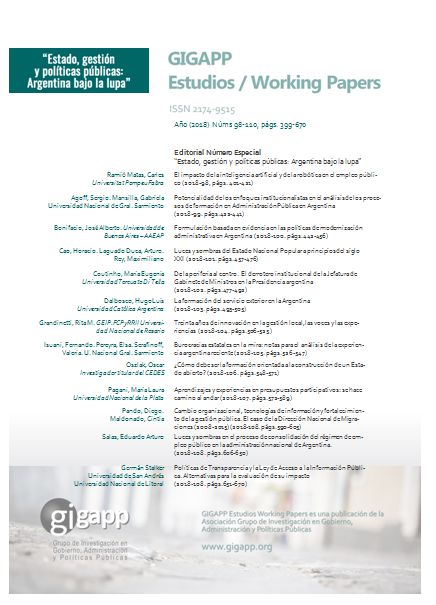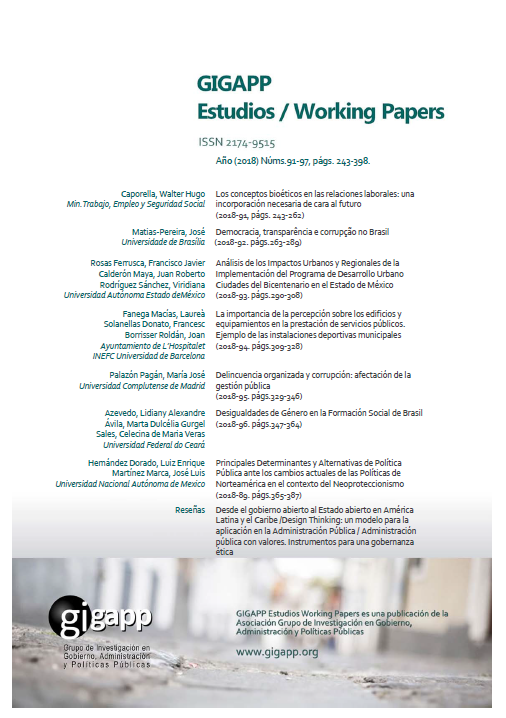-
 Studies/Working Papers New Series. Special on State, management and public policies: Argentina under the magnifying glass
Vol 5 No 98-110 (2018)
Studies/Working Papers New Series. Special on State, management and public policies: Argentina under the magnifying glass
Vol 5 No 98-110 (2018)Coordinated by Diego Pando. Universidad Nacional de San Andrés (Argentina)
In a scenario of diverse and profound political, economic and social transformations, experienced both nationally and internationally, the challenges of States and their governments as central actors for the welfare of societies have increased. Turbulence in the markets, limitations in the institutional arrangements to deal with global crises, process of social fragmentation, intense technological change, greater capacity for mobilization by non-state actors, apathy and distrust of citizens towards politics and public institutions, among other issues, entail multidimensional and low structuring challenges that are less susceptible to segmented or sectoral treatments typical of organizational designs and architectures configured on the basis of 20th century ideas.
This issue contains articles by Diego Pando, Carles Ramió, Sergio Agoff, Gabriela Mansilla, José Alberto Bonifacio, Horacio Cao, Arturo Laguado Duca, Maximiliano Rey, María Eugenia Coutinho, Hugo Luis Dalbosco, Rita M. Grandinetti, Oscar Oszlak, María Laura Pagani , Cintia Maldonado, Eduardo Arturo Salas and Germán Stalker.
-
 Studies/Working Papers New Series
Vol 5 No 91-97 (2018)
Studies/Working Papers New Series
Vol 5 No 91-97 (2018)Studies/Working Papers New Series (91-97)
With articles by Walter Hugo Caporella, José Matías Pereira, Francisco Javier Rosas Ferrusca, Juan Roberto Calderón Maya, Viridiana Rodríguez Sánchez, Laureà Fanega Macías, Francesc Solanellas Donato, Joan Borrisser Roldán, María José Palazón Pagán, Lidiany Alexandre Azevedo , Marta Dulcelia Gurgel Ávila, Celecina of Maria Veras Sales, Luis Enrique Hernández Dorado, José Luis Martínez Marca. It also includes three book reviews by Álvaro Ramírez Alujas, Ana Eva Serna Rodrigo and Ignacio García Bosch.
-
 Studies/Working Papers New Series. Special on Observing Governance. Visions from the Amazon
Vol 5 No 83-90 (2018)
Studies/Working Papers New Series. Special on Observing Governance. Visions from the Amazon
Vol 5 No 83-90 (2018)Coordinated by Josep Pont Vidal. Universidade Federal do Pará (Brasil)
The normative starting point of these works and contributions is diverse because it contributes and adds an enriching value to the current debate and analysis regarding governance. We believe that the interdisciplinary contribution contributes to a value to the extensions, performance and orders of analysis of the governance, since the set of these disciplines deals, from different perspectives, with the same action of the governance: its good practice, transparency, participation, dialogical, interactional and emancipatory.
With articles by Josep Pont Vidal, Leila Marcia Elias, João Francisco Garcia Reis, Krishina Day Ribeiro, Rebecca Castello, Francilene Cadete Costa, Jayme Nascimento Silva, Mauricio Dias Da Silva, Leonardo Jovelino Almeida Lima and Elena Pantoja de Moraes.
-
 Studies/Working Papers New Series
Vol 5 No 79-82 (2018)
Studies/Working Papers New Series
Vol 5 No 79-82 (2018)Studies/Working Papers New Series
With articles from Carles Ramió-Matas, y los ganadores del Premios Jovenes Investigadores Joan Prats 2017, Álvaro Costela Sánchez, María Paz Bermejo Pérez y Miriam Prieto Egido. It also contains a Book Review by César N. Cruz-Rubio.
-
 Estudios/Working Papers Nueva Serie. Special Issue Deliberative Spaces, governance and public policy management
Vol 4 No 72-78 (2017)
Estudios/Working Papers Nueva Serie. Special Issue Deliberative Spaces, governance and public policy management
Vol 4 No 72-78 (2017)Coordinators of this issue: Carmen Pineda Nebot, Ivan Beck Ckagnazaroff y Carolina Muñoz Mendoza.
In this volume we are going to discuss a very popular topic during the last decades, that of governance. A term that, despite having received many criticisms, has remained in the limelight of academic slang, thanks in part to the flexibility provided by its vague borders. Governance was the line of argument used to reflect on the collapse in the capacities to govern that began to be detected during the seventies and exploded in the eighties. When we could not govern or knew how to govern a world that overflowed us because of its fluidity and complexity, then we were told that we should take the path of governance.
With the presentation in this issue by Quim Brugué and articles by Ivan Beck Ckagnazaroff, Thaysa Taianne Belo Costa, Lindijane de Souza Bento Almeida, Ana Paula Teixeira de Campos, Claudia Job Schmitt, Cristina Caetano de Aguiar, Simone Martins, Bruno de Jesus Lopes, Sheila Maria Doula, Simone Martins, Bárbara Tavares de Paula, Carmen Pineda Nebot, Valdemir Pires, Herbert Cristhiano Pinheiro de Andrade, Adham Magno da Costa Braga and Ivanilde de Sousa do Espírito Santo
-
 Studies/Working Papers New Series
Vol 4 No 66-71 (2017)
Studies/Working Papers New Series
Vol 4 No 66-71 (2017)New series Studies/Working Papers GIGAPP. (66-71)
With articles from Dian Dajer Barguil, Fernanda Natasha Bravo Cruz, Doriana Daroit, Verónica Redrobán Herrera, Daniela Paredes Grijalva, Rosa María Ricoy Casas, Susana Tejada Barrenetxea, Pilar Zorrillo Calvo, Yolanda Chica Páez and Jesús Palomar i Baget.
-
 Studies/Working Papers New Series
Vol 4 No 60-65 (2017)
Studies/Working Papers New Series
Vol 4 No 60-65 (2017)New series Studies / Working Papers GIGAPP. (60-65)
With articles from Francisco Javier Rosas Ferrusca, Juan Roberto Calderón Maya, Verónica Miranda Rosales, Danilo Espinal Ospina, Marc Vilalta Reixach, Esther Querol Castillo, Angelo Brigato Ésther and Francisco Collado Campana.
-
 Studies/Working Papers New Series
Vol 4 No 55-59 (2017)
Studies/Working Papers New Series
Vol 4 No 55-59 (2017)New series Studies/Working Papers GIGAPP. (55-59)
With articles from Jorge Alejandro Ortiz Ramírez, José Adrián Cruz Pérez, Carles Ramió-Matas, Jaime González-Capitel Martorell, José Manuel Martínez Sierra, Victòria Alsina Burgués, Laila Bellix, Caroline Burle S. Guimarães and Jorge Machado.
-
 A post-bureaucratic proposal
Vol 3 No 13 (2016)
A post-bureaucratic proposal
Vol 3 No 13 (2016)There are conceptual elements of the bureaucratic model that fit perfectly with the philosophy and functions of public administration. A part of the bureaucratic model can not be ignored if one wants to avoid falling into discretion, clientelism and legal and institutional insecurity. In a context of complex governance and with a possible increase in their competences, the public administrations of the future can not face their future challenges with the bureaucratic model. The bureaucratic model is rigid and not very consistent with the management needs of public services, operating in a network and with sophisticated technological systems. An ordered business model needs to be introduced in public management. Both models can coexist if their organizational perimeters are clearly defined and the relationship patterns between both are established. It would be a complex system of equilibria but that could work in practice. The current model of public administration is an eclectic monster in which its base is the poorly implemented bureaucratic model, to which pieces of the management model and pieces of the governance model have been added. Among these three models, which coexist in a chaotic way, the old clientelist model reappears among its cracks. Clientelism is very resistant, since it is the natural form of human organization, and takes advantage of moments of crisis or the lack of consistency of models in order to be reborn. Under these conditions, stating that the current public administration has a bureaucratic model is an imposture since its design responds to such diverse conceptual tensions that no solid and solvent model really possesses.
-
 New regions and public investment in Chile
Vol 3 No 12 (2016)
New regions and public investment in Chile
Vol 3 No 12 (2016)In recent years there has been a debate in Chile about the creation of new regions. The impact of the creation of the regions of Arica and Parinacota, Los Ríos and residual spaces (regions of Tarapacá and Los Lagos) is analyzed, based on the total effective public investment and its relationship with socioeconomic indicators. Through the statistical treatment of data, it is concluded that constituting a region meant an increase in public investment per capita without damaging residual spaces. In addition, there would be no consistent relationship between the increase in total regionalized public investment and indicators.
On the contrary, a greater relationship was observed between public investment in regional decision and welfare indicators.


